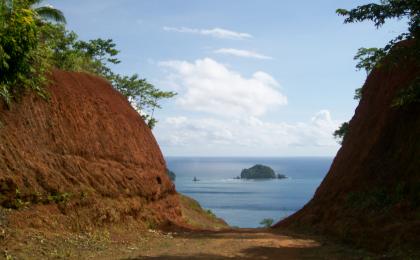The climate of the Solomon Islands is tropical with daily temperatures ranging from 23°C to 30°C and wide variation in rainfall depending on geographical location and time of year. Drought, which is often linked to the El Niño Southern Oscillation (ENSO), affected food gardens and resulting in the National Disaster Management Office having to distribute food supplies to affected areas. A milder drought with similar effects was experienced during the 2009 El Nino. December to March is cyclone season when the country usually experiences one to two tropical cyclones per year, mainly in the south and east. A manifestation of climatic extreme events and resultant damage has already been felt. Cyclones are increasingly becoming the norm, and are indicative of the costs likely to be imposed by climate change. Over the past few years flooding, king tides, excessive rainfall and storm surges have rendered rural locations and communities disaster areas. Without the introduction of sufficient measures to support the Solomon Islands to adapt to a range of contingencies, the scale of damages will be larger, and the toll of opportunities foregone will be longer-lasting.
Objective: The project implemented by the United Nations Development Programme (UNDP) is working to strengthen ability of communities in the Solomon Islands to make informed decisions and manage likely climate change driven pressures on food production and management systems. First, the project plans to promote and pilot community adaptation activities that enhance food security and livelihood resilience in pilot communities on the windward and leeward sides of the main islands and on the artificial islands of Langalanga and Lau lagoons on the leeward side of Malaita Province. The project also aims to adjust national and sub-national policies related to governing agriculture to take adaptation into consideration and to foster the generation and diffusion of knowledge on adapting to climate change in a systematic manner at the community and regional levels.
Learn more
- UNDP project page
- Photo essay on UNDP Exposure
- Videos of the SWoCK (Strongem Waka lo Community fo Kaikai) project
- Climate-resilient farming in the Solomon Islands
- SWoCK Project: Automatic Weather Stations
- SWoCK Project: Improved germplasm and bulking
- SWoCK Project: Integrated Community Based Land Use Planning
- SWoCK Project: Women and Climate Change Adaptation
- SWoCK Project Backyard Organic farming in the Langalanga Lagoon
- In the news
- The Diplomat, Sept. 2, 2014: Food Security and Solomon Islands: Pests and other ravages of climate change are creat
- Al Jazeera, Sept. 23, 2014: Solomon women carry climate change burden
- Trust.org, Sept. 19, 2014: With ‘even the fish confused’, Solomons seek new weather data
- Success story published in UNDP Adaptation Bulletin issue 13, July 2013
| Component 1: Community based adaptation initiatives implemented in at least 30 communities across at least 3 regions in Solomon Islands | USD 3,500,000 |
| Component 2: Institutional strengthening to support climate resilient policy frameworks for the agriculture sector | USD 750,000 |
| Component 3: Climate change adaptation specific knowledge production, sharing, and dissemination | USD 350,000 |
| Project/Programme Execution Cost | USD 500,000 |
| Total Project/Programme Cost (= Project Components + Execution Cost) | USD 5,100,000 |
| Implementing Fee | USD 433,500 |
| Grant Amount (= Total Project/Programme Cost + Implementing Fee) | USD 5,610,000 |
Project Documents
| Attachment | Type | Size |
|---|---|---|
| Project document | DOC | 3 MB |
| Inception Report | 211 KB | |
| PPR1 (for web) | XLS | 411 KB |
| PPR2 (for web) | XLS | 296 KB |
| PPR3 (for web) | XLS | 352 KB |
| PPR4 (for web) | XLS | 452 KB |
| Mid-term evaluation report | 1 MB | |
| Final evaluation report | 3 MB |



